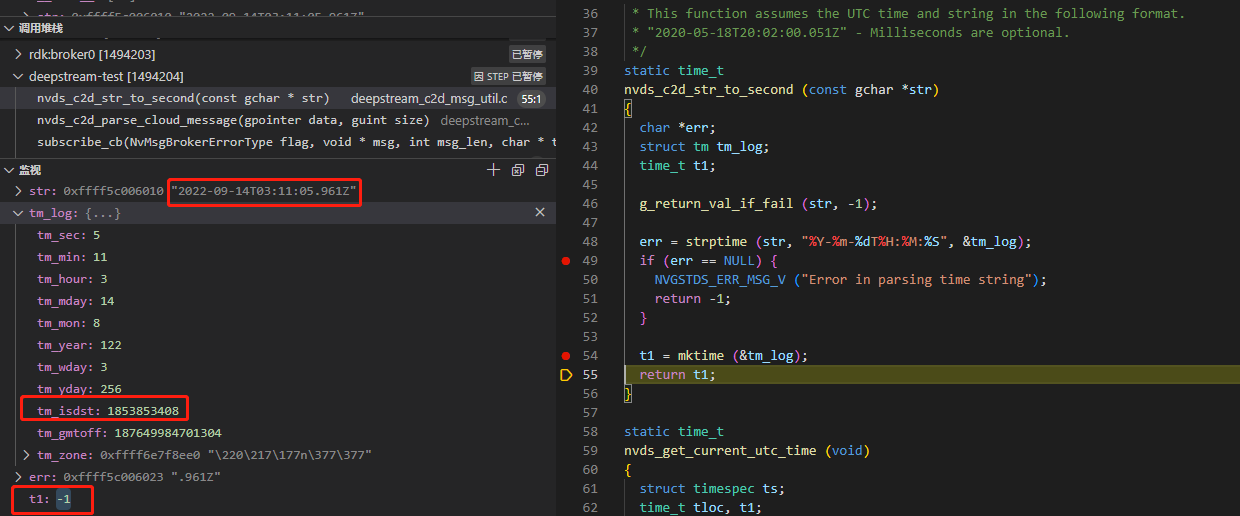my python shell to send record request as followed:
from kafka import KafkaProducer
from kafka.errors import kafka_errors
import json
import datetime
import time
producer =KafkaProducer(bootstrap_servers='*********')
topic = "nx"
count=1
while count<3:
d1 = datetime.datetime.utcnow()
d2 = datetime.datetime.utcnow()-datetime.timedelta(seconds=10*count)
d1string = d1.isoformat("T")[:-3] +"Z"
d2string = d2.isoformat("T")[:-3] +"Z"
d = {"command": "start-recording","start": d2string,"end":d1string,"sensor": {"id": str(count)}}
print(d)
data = json.dumps(d)
future = producer.send(topic,key='count_num'.encode('utf-8'),value=data.encode('utf-8'),partition=0)
try:
future.get(timeout=10)
except kafka_errors:
traceback.format_exc()
count +=1
time.sleep(10)
And we receive the errors like:
Our deepstream-test5-app config is
[application]
enable-perf-measurement=1
perf-measurement-interval-sec=5
#gie-kitti-output-dir=streamscl
[tiled-display]
enable=0
rows=2
columns=2
width=1280
height=720
gpu-id=0
#(0): nvbuf-mem-default - Default memory allocated, specific to particular platform
#(1): nvbuf-mem-cuda-pinned - Allocate Pinned/Host cuda memory, applicable for Tesla
#(2): nvbuf-mem-cuda-device - Allocate Device cuda memory, applicable for Tesla
#(3): nvbuf-mem-cuda-unified - Allocate Unified cuda memory, applicable for Tesla
#(4): nvbuf-mem-surface-array - Allocate Surface Array memory, applicable for Jetson
nvbuf-memory-type=0
[source0]
enable=1
#Type - 1=CameraV4L2 2=URI 3=MultiURI
type=4
uri=rtsp://****
num-sources=1
gpu-id=0
nvbuf-memory-type=0
drop-frame-interval=0
smart-record=1
# 0 = mp4, 1 = mkv
smart-rec-container=0
smart-rec-file-prefix=a
smart-rec-dir-path=../../../../../sources/apps/sample_apps/deepstream-test-sutpc/configs
# smart record cache size in seconds
smart-rec-cache=30
smart-rec-duration=10
[source1]
enable=1
#Type - 1=CameraV4L2 2=URI 3=MultiURI
type=4
uri=rtsp://****
num-sources=1
gpu-id=0
nvbuf-memory-type=0
drop-frame-interval=0
smart-record=1
# 0 = mp4, 1 = mkv
smart-rec-container=0
smart-rec-file-prefix=a
smart-rec-dir-path=../../../../../sources/apps/sample_apps/deepstream-test-sutpc/configs
# smart record cache size in seconds
smart-rec-cache=30
smart-rec-duration=10
[source2]
enable=1
#Type - 1=CameraV4L2 2=URI 3=MultiURI
type=4
uri=rtsp://****
num-sources=1
gpu-id=0
nvbuf-memory-type=0
drop-frame-interval=0
smart-record=1
# 0 = mp4, 1 = mkv
smart-rec-container=0
smart-rec-file-prefix=a
smart-rec-dir-path=../../../../../apps/sample_apps/deepstream-test-sutpc/configs
# smart record cache size in seconds
smart-rec-cache=30
smart-rec-duration=10
[source3]
enable=1
#Type - 1=CameraV4L2 2=URI 3=MultiURI
type=4
uri=rtsp://****
num-sources=1
gpu-id=0
nvbuf-memory-type=0
drop-frame-interval=0
smart-record=1
# 0 = mp4, 1 = mkv
smart-rec-container=0
smart-rec-file-prefix=a
smart-rec-dir-path=../../../../../sources/apps/sample_apps/deepstream-test-sutpc/configs
# smart record cache size in seconds
smart-rec-cache=30
smart-rec-duration=10
[sink0]
enable=0
#Type - 1=FakeSink 2=EglSink 3=File
type=1
sync=1
source-id=0
gpu-id=0
enc-type = 1
nvbuf-memory-type=0
[sink1]
enable=0
#Type - 1=FakeSink 2=EglSink 3=File 4=UDPSink 5=nvdrmvideosink 6=MsgConvBroker
type=6
msg-conv-config=dstest5_msgconv_sample_config.txt
#(0): PAYLOAD_DEEPSTREAM - Deepstream schema payload
#(1): PAYLOAD_DEEPSTREAM_MINIMAL - Deepstream schema payload minimal
#(256): PAYLOAD_RESERVED - Reserved type
#(257): PAYLOAD_CUSTOM - Custom schema payload
msg-conv-payload-type=0
msg-broker-proto-lib=/opt/nvidia/deepstream/deepstream/lib/libnvds_kafka_proto.so
msg-broker-conn-str=******
topic=nxtest
#Optional:
#msg-broker-config=../../deepstream-test4/cfg_kafka.txt
[sink2]
enable=1
#Type - 1=FakeSink 2=EglSink 3=File 4=RTSPStreaming
type=4
#1=h264 2=h265
codec=1
#encoder type 0=Hardware 1=Software
enc-type=0
source-id=0
sync=0
bitrate=4000000
#H264 Profile - 0=Baseline 2=Main 4=High
#H265 Profile - 0=Main 1=Main10
profile=0
# set below properties in case of RTSPStreaming
rtsp-port=9091
udp-port=5400
[sink3]
enable=1
#Type - 1=FakeSink 2=EglSink 3=File 4=RTSPStreaming
type=4
source-id=1
#1=h264 2=h265
codec=1
#encoder type 0=Hardware 1=Software
enc-type=0
sync=0
bitrate=4000000
#H264 Profile - 0=Baseline 2=Main 4=High
#H265 Profile - 0=Main 1=Main10
profile=0
# set below properties in case of RTSPStreaming
rtsp-port=9090
udp-port=5401
[sink4]
enable=1
#Type - 1=FakeSink 2=EglSink 3=File 4=RTSPStreaming
type=4
source-id=2
#1=h264 2=h265
codec=1
#encoder type 0=Hardware 1=Software
enc-type=0
sync=0
bitrate=4000000
#H264 Profile - 0=Baseline 2=Main 4=High
#H265 Profile - 0=Main 1=Main10
profile=0
# set below properties in case of RTSPStreaming
rtsp-port=9092
udp-port=5402
[sink5]
enable=1
#Type - 1=FakeSink 2=EglSink 3=File 4=RTSPStreaming
type=4
source-id=3
#1=h264 2=h265
codec=1
#encoder type 0=Hardware 1=Software
enc-type=0
sync=0
bitrate=4000000
#H264 Profile - 0=Baseline 2=Main 4=High
#H265 Profile - 0=Main 1=Main10
profile=0
# set below properties in case of RTSPStreaming
rtsp-port=9093
udp-port=5403
[osd]
enable=1
gpu-id=0
border-width=1
text-size=15
text-color=1;1;1;1;
text-bg-color=0.3;0.3;0.3;1
font=Arial
show-clock=0
clock-x-offset=800
clock-y-offset=820
clock-text-size=12
clock-color=1;0;0;0
nvbuf-memory-type=0
[streammux]
gpu-id=0
##Boolean property to inform muxer that sources are live
live-source=1
batch-size=4
##time out in usec, to wait after the first buffer is available
##to push the batch even if the complete batch is not formed
batched-push-timeout=60000
## Set muxer output width and height
width=1920
height=1080
##Enable to maintain aspect ratio wrt source, and allow black borders, works
##along with width, height properties
enable-padding=0
nvbuf-memory-type=0
## If set to TRUE, system timestamp will be attached as ntp timestamp
## If set to FALSE, ntp timestamp from rtspsrc, if available, will be attached
# attach-sys-ts-as-ntp=1
[primary-gie]
enable=1
gpu-id=0
batch-size=4
## 0=FP32, 1=INT8, 2=FP16 mode
bbox-border-color0=1;0;0;1
bbox-border-color1=0;1;1;1
bbox-border-color2=0;1;1;1
bbox-border-color3=0;1;0;1
nvbuf-memory-type=0
interval=0
gie-unique-id=1
model-engine-file=../../../../../samples/models/Primary_Detector/resnet10.caffemodel_b8_gpu0_int8.engine
labelfile-path=../../../../../samples/models/Primary_Detector/labels.txt
config-file=./../../../../samples/configs/deepstream-app/config_infer_primary.txt
[tracker]
enable=1
# For NvDCF and DeepSORT tracker, tracker-width and tracker-height must be a multiple of 32, respectively
tracker-width=640
tracker-height=384
ll-lib-file=/opt/nvidia/deepstream/deepstream/lib/libnvds_nvmultiobjecttracker.so
ll-config-file=../../../../../samples/configs/deepstream-app/config_tracker_DeepSORT.yml
gpu-id=0
enable-batch-process=4
enable-past-frame=1
display-tracking-id=1
Then we debug the program by gdb, and we found nvds_c2d_str_to_second :
The
strptimecan not convert the
2022-09-14T03:11:05.961Z into
tm_log so that t1 is -1,
but when we only add
nvds_get_current_utc_time before call
nvds_c2d_str_to_second and remake
timeStr = json_object_get_string_member (object, "start");
+++ curUtc = nvds_get_current_utc_time ();
startUtc = nvds_c2d_str_to_second (timeStr);`
Everything is well. It can seem like this:
Too weird, it looks like nvds_get_current_utc_time triggers the creation mechanism to cause the correct conversion. Or is there something wrong with the data format I sent?
Supplementary observations:
The structure tm_logof error situation is constructed as
Under normal conditions, it is constructed as







